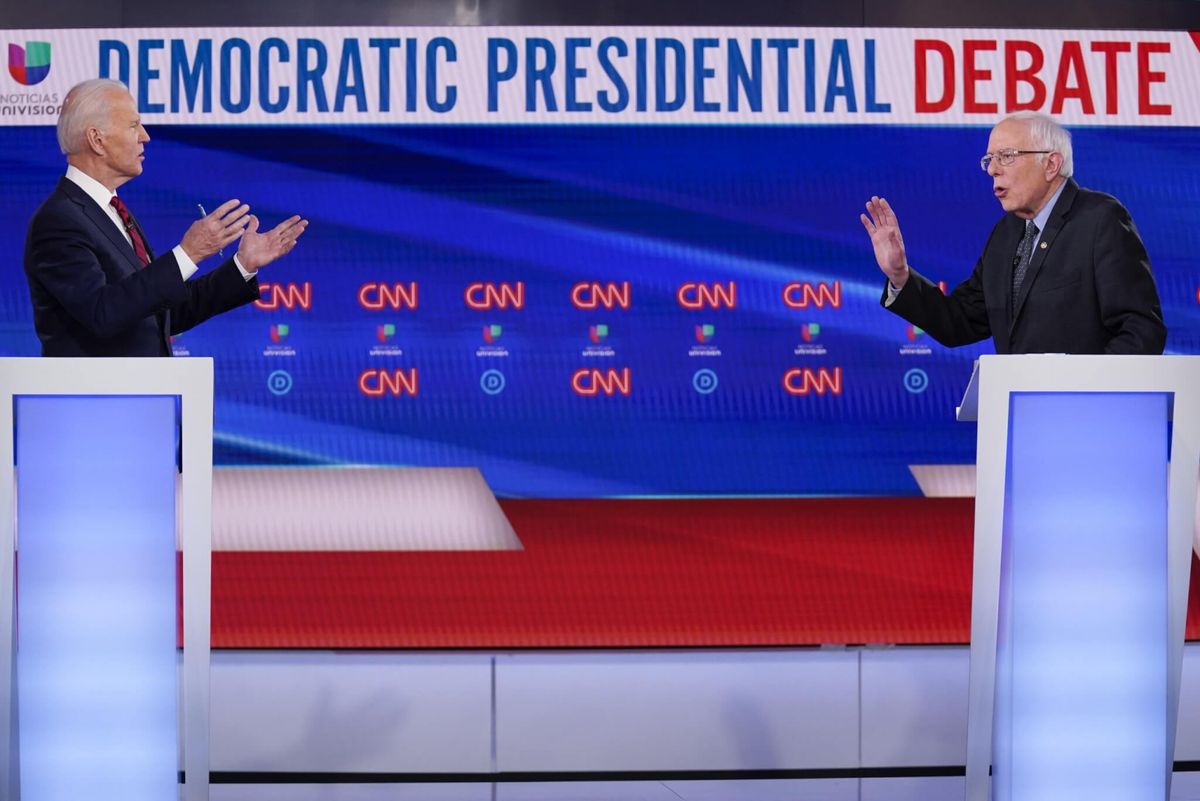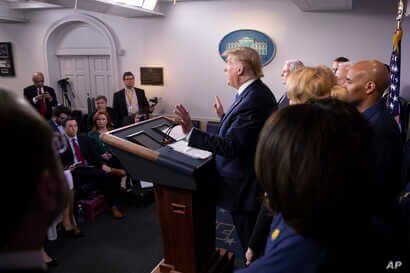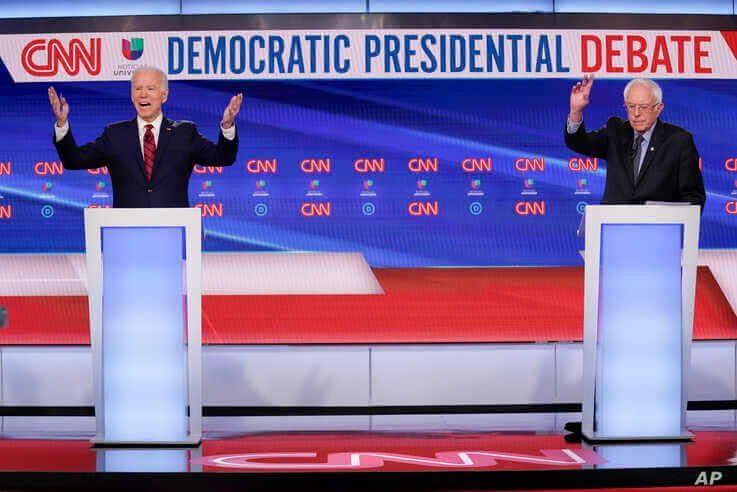
In Feisty Debate, Biden, Sanders Clash on Best Way to Defeat Trump
The last two major U.S. Democratic presidential candidates – former Vice President Joe Biden and Vermont Sen. Bernie Sanders – clashed Sunday night in a spirited debate on a range of issues as they made their best case to be the party’s nominee to face Republican President Donald Trump in November’s national election.
The two candidates attacked Trump repeatedly, with Biden calling him “an existential threat to the country,” while Sanders declared that Trump is a “pathological liar” overseeing a “corrupt administration.”
Both assailed Trump’s handling of the coronavirus pandemic in the U.S., with Sanders accusing him of “undermining scientists” and Biden faulting the administration for refusing in the early stages of the crisis to import test kits from other countries when the U.S. had the opportunity to do so.

“This is like we are being attacked,” Biden said. “In a war, you do whatever is required to do to take care of your people. Everything you would need to take care of this crisis would be free. It would be paid for by the U.S. taxpayers.”
Biden said he would call in the military to cope with the crisis while Sanders skirted the issue. Instead, Sanders complained about Trump undermining the government’s response by contradicting what government experts and scientists have recommended.
“What we have to do is shut this president up,” he said.
The two also virtually agreed on naming a woman to be their vice presidential running mate. Biden said he definitely would pick a woman and Sanders said “in all likelihood” he would, provided he could find someone who agrees with his progressive policies.
But the two Democrats quarreled with each other on how best to take on Trump, the New York real estate mogul and first-time politician who won an upset victory in 2016 to become the country’s 45th president.
Biden and Sanders often argued over the minutiae of legislation in the U.S. Congress when both were senators and later when Biden served two terms as vice president under former President Barack Obama from 2009-2017.
Sanders called for a political revolution to take on special interests that control health care and energy production in the U.S. Biden promoted less dramatic changes, but ones that also would move American policies significantly to the left philosophically from the Trump administration.
Sanders argued that his plan for a government takeover of health care in the U.S. – he calls it Medicare for All – was a moral imperative so that “everyone will get the care they need.” Biden said his plans for more measured improvements on top of the health care plan adopted under Obama – popularly known as Obamacare – would help more Americans at less cost.
“People are looking for results, not a revolution,” Biden said. “What people want is hope and they need it now, not four years from now.”

Biden at one point cut off Sanders, saying: “With all due respect to Medicare for All, you have a single-payer system in Italy. It doesn’t work there.” Biden was referring to the coronavirus crisis in Italy that is among the worst in Europe. “It has nothing to do with Medicare for All — that would not solve the problem at all. We can take care of that right now by making sure that no one has to pay for treatment period because of the crisis,” he said.
On another issue, Sanders attacked Biden’s support for the 2008 bailout of floundering Wall Street financial giants as the recession worsened more than a decade ago. Biden retorted, “It kept us from going into a depression.”
Sanders also criticized Biden’s support of the 2003 U.S. invasion of Iraq, which Biden now admits was a mistake.
Sanders claimed Biden supported cuts in the country’s cherished Social Security payments to older Americans.
“No, I did not,” Biden responded sharply.
Sunday’s debate had been scheduled before a live audience, just as with a string of previous Democratic encounters. But the spread of the deadly coronavirus forced the two longtime politicians into CNN’s Washington studio for their two-hour debate and there was no audience, in an effort to limit the possibility of exposing even more people to the virus.
Biden in the lead
At the moment, Biden holds a clear edge in the delegate count in the race for the Democratic nomination. The two squared off in what could turn out to be the last debate before the party’s national nominating convention in July.
After a stumbling start in the first three presidential nominating contests in February, Biden has won 16 of the last 21 state elections and is heavily favored in the next four on Tuesday. They are scattered across the U.S., in Florida in the South, Ohio and Illinois in the Midwest, and Arizona in the Southwest.
Biden needs a majority of at least 1,991 delegates at the convention and currently leads Sanders, 809-666. Projections at the fivethirtyeight.com political forecasting site say Biden is likely to add another 200 delegates to that margin in Tuesday’s voting.
The earlier debates have had at least six candidates on stage, often leading to a verbal free-for-all with candidates talking over each other and leaving television viewers at a loss to understand any single individual.
Even with the debate stage narrowed to two candidates, Biden and Sanders frequently interrupted each other.
All of the other Democratic candidates who have dropped out of the presidential race have endorsed Biden as they exited, with the exception of Massachusetts Sen. Elizabeth Warren, who has yet to endorse either Biden or Sanders.
But with Biden now projected to win the party nomination in his third run for the presidency over three decades, Sanders, a self-declared democratic socialist, has sought to make the case that he is best-suited to take on Trump, who at 73 is younger than either Biden, 77, or Sanders, 78.
Biden, known widely for verbal gaffes, in recent campaign appearances mixed up what day the last primary elections were occurring and also was unable to recall key words from the country’s Declaration of Independence that many school-age children could recite.
In recent campaign appearances, the normally verbose Biden has read his speeches off a teleprompter and the addresses have been noticeably shorter to minimize the chance for more verbal missteps.
That, of course, wasn’t possible with Sunday night’s give-and-take with Sanders and Biden standing two meters apart behind podiums. Biden seemed self-assured throughout the debate and assertive in his exchanges with Sanders.
But both said they would support and campaign for the other against Trump, no matter which of them wins the Democratic nomination.
 Biden and Democrats Cry Racism and Live In Fantasy As Globalism Literally Kills UsNext PostSanders, Biden Debate Coronavirus Response
Biden and Democrats Cry Racism and Live In Fantasy As Globalism Literally Kills UsNext PostSanders, Biden Debate Coronavirus Response







